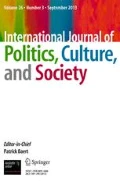Abstract
The current study investigates Turkish politicians’ code mixing in their public speeches and the variation among the speakers as well as the historical and linguistic factors influencing this variation. It is hypothesized that the variation either consciously or unconsciously outlines the identity of the speaker in the direction that s/he wants to be identified by their audience. The findings are interpreted with reference to the language reform (a linguistic change during the transition from the Ottoman Empire to the Turkish Republic) that Turkish language went through in 1928.


Similar content being viewed by others
References
Abu Haidar, F. (1996). Turkish as a marker of ethnic identity and religious affiliation. In Y. Suleiman (Ed.), Language and identity in the Middle East and North Africa (pp. 117–133). Richmond: Curzon.
Amara, H. M. (1996). Hebrew and English borrowings in Palestinian Arabic in Israel: A sociolinguistic study in lexical integration and diffusion. In Y. Suleiman (Ed.), Language and Society in the Middle East and North Africa. London: Curzon.
Amara, M., & Spolsky, B. (1996). The Construction of Identity in a divided Palestinian village: Sociolinguistic evidence. In Y. Suleiman (Ed.), Language and identity in the Middle East and North Africa (pp. 81–100). Richmond: Curzon.
Association, T. L. (2005). Modern Turkish Dictionary, 2005, Retrieved on September 22, 2010 from http://tdk.org.tr/TR/Genel/BelgeGoster.aspx?F6E10F8892433CFFAAF6AA849816B2EFB40CE59E171C629F.
Aydıngün, A., & Aydıngün, İ. (2004). The role of language in the formation of Turkish National Identity and Turkishness. Nationalism and Ethnic Politics, 10, 415–432.
Ayturk, I. (2004). Turkish Linguists against the West: The Origins of Linguistic Nationalism in Atatürk’s Turkey. Middle Eastern Studies, 40(6), 1–25.
Balim, C. (1996). Turkish as a symbol of survival and identity in Bulgaria and Turkey. In Y. Suleiman (Ed.), Language and identity in the Middle East and Africa (pp. 101–117). Richmond: Curzon.
Bear, J. M. (1985). Historical factors influencing attitudes towards foreign language learning in Turkey. Journal of Human Sciences of Middle East Technical University, 1, 27–36.
Bhatt, M. R. (2008). In other words: Language mixing, identity representations, and third space. Journal of Sociolinguistics, 12(2), 177–200.
Cuceoglu, D., & Slobin, D. (1980). Effects of Turkish language reform on person perception. Journal of Cross-Cultural Psychology, 11(3), 297–326.
Johnstone, B. (2000). Qualitative methods in sociolinguistics. New York: Oxford University Press.
Özen, Ö. F. (2003, January 5). Dil Yarası: Dog-Shop [Language Fault: Dog Shop] Cumhuriyet. Retrieved on February 8, 2007 from http://www.dilimdilim.com/icerik/makaleler/dil_yarasi.htm.
Trudgill, P. (2002). Sociolinguistics variation and change. Edinburgh: Edinburgh University Press.
Williams, G. (1992). Sociolinguistics: A Sociological Critique. London: Routledge.
Author information
Authors and Affiliations
Corresponding author
Rights and permissions
About this article
Cite this article
Uzum, B., Uzum, M. The Historical and Linguistic Analysis of Turkish Politicians’ Speech. Int J Polit Cult Soc 23, 213–224 (2010). https://doi.org/10.1007/s10767-010-9103-7
Published:
Issue Date:
DOI: https://doi.org/10.1007/s10767-010-9103-7




